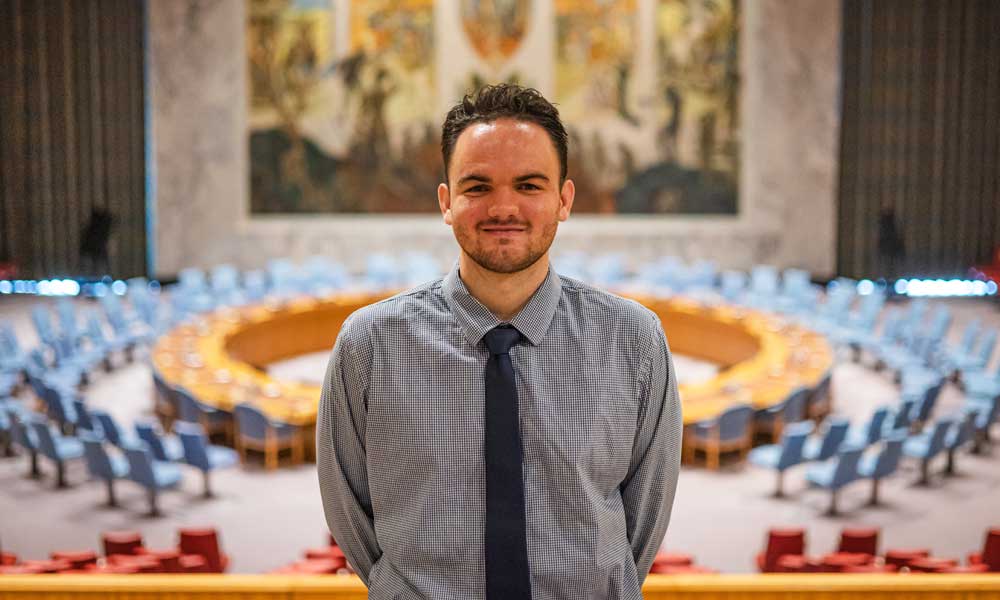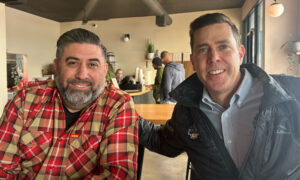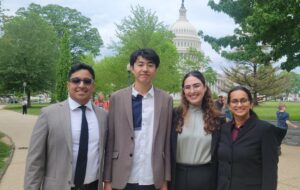Elijah Dow’s public service career began in his hometown of Sandy, Utah, a suburb of Salt Lake City.
When he was 19, Dow noticed his community grappling with the rising problem of homelessness. He felt that Salt Lake City’s proposed solution – simply pushing people who were unhoused to a far away part of town – was wrong.
“Community groups were advocating for the Salt Lake City Council to bus those experiencing homelessness to a remote area on the other side of the Great Salt Lake,” Dow said. “That fired me up and motivated me to learn more about this issue.”
So, Dow volunteered at a homeless shelter, where he spent five days a week working in the kitchen, cleaning rooms, and talking directly to people experiencing homelessness. He later became a leader in the Salt Lake Valley Coalition to End Homelessness, where he surveyed more than 300 people without housing and presented findings to the city.
“I spent most of my days volunteering and just asking questions to those experiencing homelessness, asking questions to staff, even the people serving food,” Dow said. “I got to know those members of my community experiencing homelessness. I was just so very curious about it, and that led me to kind of fall down this rabbit hole, wanting to know more, wanting to know what we could do, solution wise, to really handle this problem.”
That brought Dow to USC, where he’s a Graduate Research Assistant at the Homelessness Policy Research Institute (HPRI). Dow, the graduate speaker for this year’s USC Price School of Public Policy Commencement ceremony, now has an ambitious, long-term career goal: He wants to return home, run for local office, and use what he’s learned about public policy to help the community where he grew up.
“I’ve always had this passion for making change in my own community,” Dow said.
A sense of community
While volunteering at a shelter gave Dow a service member’s view of homelessness, working at HPRI has allowed him to see the issue through a policy lens.
“During my time at HPRI, I came to understand that addressing homelessness isn’t just about providing housing but transforming the systems that perpetuate it by investing in low-barrier, community-based mental health care and building coordinated, person-centered services,” Dow said.
Dow, who will earn a Master of Public Policy in May, has researched chronic homelessness in LA and just finished a project about the barriers that Black Angelenos who experience homelessness face when returning to work. He also worked on a research paper evaluating the effectiveness of Universal Basic Income Programs and Guaranteed Basic Income Programs.
He credited HPRI for providing mentorship and the ability to pursue his passions.

Master of Public Policy
Advocate & Innovate for a More Just World
Effective public policy has the power to disentangle increasingly complex global and domestic challenges. With an MPP from USC, you will have that power too.
Find Out More“One of the best parts of this job is the freedom we have to explore the areas of homelessness that we’re most passionate about,” Dow said. “On top of that, we know we’ll have the full support of our peers and supervisors, which creates a really encouraging environment for learning and growth.”
At HPRI, what stood out about Elijah was his embodiment of “the academic spirit,” said Nick Weinmeister, Project Administrator at HPRI.
“Elijah is always curious to learn more, whether that be to meet new people or learn about topics new to him. He is a very approachable person in every sense of the word, particularly because he is diligent in keeping an open and inviting mind,” Weinmeister said. “He lives a very balanced life that helps him find common ground with almost any person he comes across, and you can tell that he loves engaging with others to share ideas, opinions, and understandings.”
The USC Price School has given Dow research opportunities beyond homelessness. For his practicum project, Dow researched the impact of the COVID-19 pandemic, global conflicts, climate change, and mass displacements on institutions responsible for implementing the United Nations’ (UN) Sustainable Development Goals. He presented his findings to officials at the UN headquarters in New York City.
“That was honestly life-changing for me. It was an opportunity for me to do what I love: present policy recommendations to people who can actually make a difference,” Dow said.
As graduate speaker, Dow will deliver a speech to his fellow graduates at commencement on May 16. Reflecting on his time at USC Price, he noted that LA provided a living laboratory to address policy challenges, including the housing crisis. “You can’t really turn a corner in LA without understanding the impact of policy,” Dow noted.
The city, as well as the USC Price School, has also reinforced the importance of community, a lesson he plans to take home to Utah.
“When you come out to L.A. without an existing community and then witness the strength and vibrancy of the communities around you, it’s incredibly inspiring,” Dow said. “Being part of USC Price has shown me what’s possible when people are deeply connected to where they live and committed to making it better. That’s something I’ll carry with me moving forward – it’s really shaped my vision for what I want to do next. Eventually, I plan to run for local office in my own community and help build that same sense of connection and purpose at home.”




